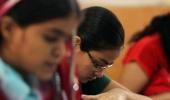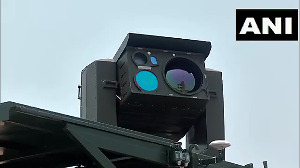'During a match, there is a lot of noise from the stadium -- cheers for sixes and fours -- but the batter focuses on the ball, not the pressure.'
'If you don't take pressure and focus on your duty, you can overcome stress easily.'

From leadership lessons to meditation, giving exams versus gaining knowledge, Prime Minister Narendra D Modi touched upon host of issues in a free-wheeling chat with school students during the eighth edition of his annual Pariksha Pe Charcha broadcast on February 10.
In a shift from the traditional town hall format, Modi opted for a more informal setting this year and held a deeper conversation with around 35 students at the Sunder Nursery in New Delhi.
Modi told students gyan (knowledge) and examinations are two different things and one should not view exams as the be-all and end-all in life.

During the interaction with students drawn from states and UTs from across the country, the prime minister said students should not be confined and allowed to explore their passions.
He asked them to use their time in a planned manner so as to manage it effectively.
The prime minister shared his thoughts on various topics like 'master your time, master your life; live in the moment; finding positives; nourish to flourish'.
Urging parents to not use their children to show off, he instead advised parents to support their children instead and not compare them with others.

Akansha, a student from Kerala, greeted the prime minister in Hindi. When he asked her how she spoke Hindi so well, she replied, "I like Hindi a lot." She said she wrote Hindi poems as well and recited one for the prime minister.
Then, she had a question for Modi. "Are good grades the only path to a successful future?"
The prime minister redirected the question to other students, who responded that knowledge matters more than marks. Another student remarked that exams are part of the journey, not the destination.
Discussing ways to handle exam pressure, Modi said, "Unfortunately, there is a common belief that if someone does not score well in the 10th or 12th grade, their life is ruined. Our society creates a tense atmosphere at home over low grades. You may also be under pressure but prepare without worrying about it.
Drawing an analogy with cricket, he said, "During a match, there is a lot of noise from the stadium -- cheers for sixes and fours -- but the batter focuses on the ball, not the pressure.
"If you do not take pressure and focus on your duty, you can overcome stress easily."
He added, "One must constantly evaluate and challenge oneself."

During the session, Modi highlighted the importance of nutrition and inquired about the students' food and lifestyle choices
Emphasising the role of nutrition, the PM said, "Your growth depends on what, when, how and why you eat."
He shared an anecdote, recalling a visit to a family where a child avoided eating millet roti, believing it would darken his skin and instead preferred rice.
On a lighter note, Modi asked students, "Do you guys check Google before deciding what to eat?"
Speaking further, he stated, "The absence of illness does not mean we are healthy. Sleep is also dependent on nutrition. Medical science also focuses on sleep. Everyone should spend time in the morning sun."
He advised them to take "Surya Snan (sunbath)."
A student from Arunachal Pradesh responded saying her state is known as the "Land of the Rising Sun" and they practise sunbathing daily.

Speaking on the issue of leadership, the PM said people take cue from the conduct of leaders and speeches alone do not help.
"Leadership is not imposed; people around you accept you. For this, you have to change yourself. You have to be an example. A leader should be helpful. Don't demand respect; command it. This will happen when you transform yourself. To be a leader, you must learn teamwork and patience is crucial. Earning trust is very necessary."
Explaining the definition of a reader, Modi said, "It's someone wearing a kurta-pyjama, a jacket, giving speeches on various platforms... that's not just the case. If anyone becomes a leader, their job is not to correct other's mistakes. It's to make yourself an example."
Citing the example of a class monitor, the PM said, "If everyone has to come on time but the class monitor himself does not adhere to the rules, will anyone listen to him? No. But, for example, if a teacher has given you homework and class monitor finishes it first and even helps others, then he is a good leader."
He concluded, "There should be ethics in leadership. Jahan kaam, wahan hum (Where there is work, we should be there)."

Well-known personalities like actor Deepika Padukone, boxer MC Mary Kom and spiritual leader Sadhguru have also shared their experiences and knowledge with students on key aspects of life and learning in different episodes of Pariksha Pe Charcha this year.
Pariksha Pe Charchca is an annual event in which Modi interacts with students appearing for board examinations and their parents and teachers.
During this broadcast, organised by the department of school education and literacy, he answers students' queries related to exam stress and other issues and shares tips on how to remain stress-free during the board exams.
The first edition of the prime minister's interactive programme with school and college students was held at the Talkatora Stadium in February 2018.
Its seventh edition was held in a town hall format at the Bharat Mandapam in Pragati Maidan, engaging participants from across the country and overseas.
Photographs curated by Manisha Kotian/Rediff.com











 © 2025
© 2025